Invasion
During the mid-18th century, Bengal was thrust into a state of turmoil due to repeated invasions by Maratha forces, a period known as the Maratha expeditions in Bengal, lasting from 1742 to 1751. The leader of these expeditions was Raghoji Bhonsle of Nagpur. These invasions followed the Marathas’ victory in the Carnatic at the Battle of Trichinopoly, bolstering their confidence and ambition.
The first major invasion occurred in 1742, leading to significant plundering of Murshidabad and Hooghly, though the Marathas were initially repelled by Nawab Alivardi Khan, the ruler of Bengal. Despite this, the Marathas continued their campaigns, conducting a total of five major invasions into Bengal over the next decade.
The Maratha forces referred to as “Bargis” in the local dialect, became notorious for their brutal tactics, which included mass atrocities against civilians, looting, and destruction of property.
There was a severe impact of these invasions, estimating the deaths of around 400,000 civilians in Western Bengal and Bihar due to the conflict. The Bargis specifically targeted economic centers, resulting in a significant disruption of the local economy, particularly affecting the silk and textile industries.
The intensity of these conflicts forced many locals to flee to safer areas, including East Bengal, while others suffered from the economic downturn caused by the disrupted agricultural and industrial activities. Alivardi Khan, amidst managing internal military strife and rebellion, was compelled to negotiate with the Marathas, agreeing to pay them Chauth (a form of tax) to cease their invasions.
Turmoil
In the serene convergence of the Ganga and Ajay rivers, the ancient town of Katwa sprawled under the generous shade of Bengal.
Amongst its many whispered legends, the dense forest at its edge stood silent, wrapped in an enigma that even the locals dared not unravel. Bhaskar Pandit, a seasoned military general of the Maratha regiment, was drawn to this mysterious curtain of green not by chance, but by destiny’s subtle calling.
Bhaskar, whose prowess in battles was sung across the plains of Maharashtra, had embarked on a journey of solitude to discover lands untouched by his campaigns. He had planned to travel further to Murshidabad, but the ferries were halted due to the turbulent weather. Without much choice, and with the night closing in, he decided to take a shortcut through the mysterious forest nearby. His imposing figure, cloaked in the subtle garb of a traveler, concealed the lethal acumen of a warrior whose decisions once swayed wars.
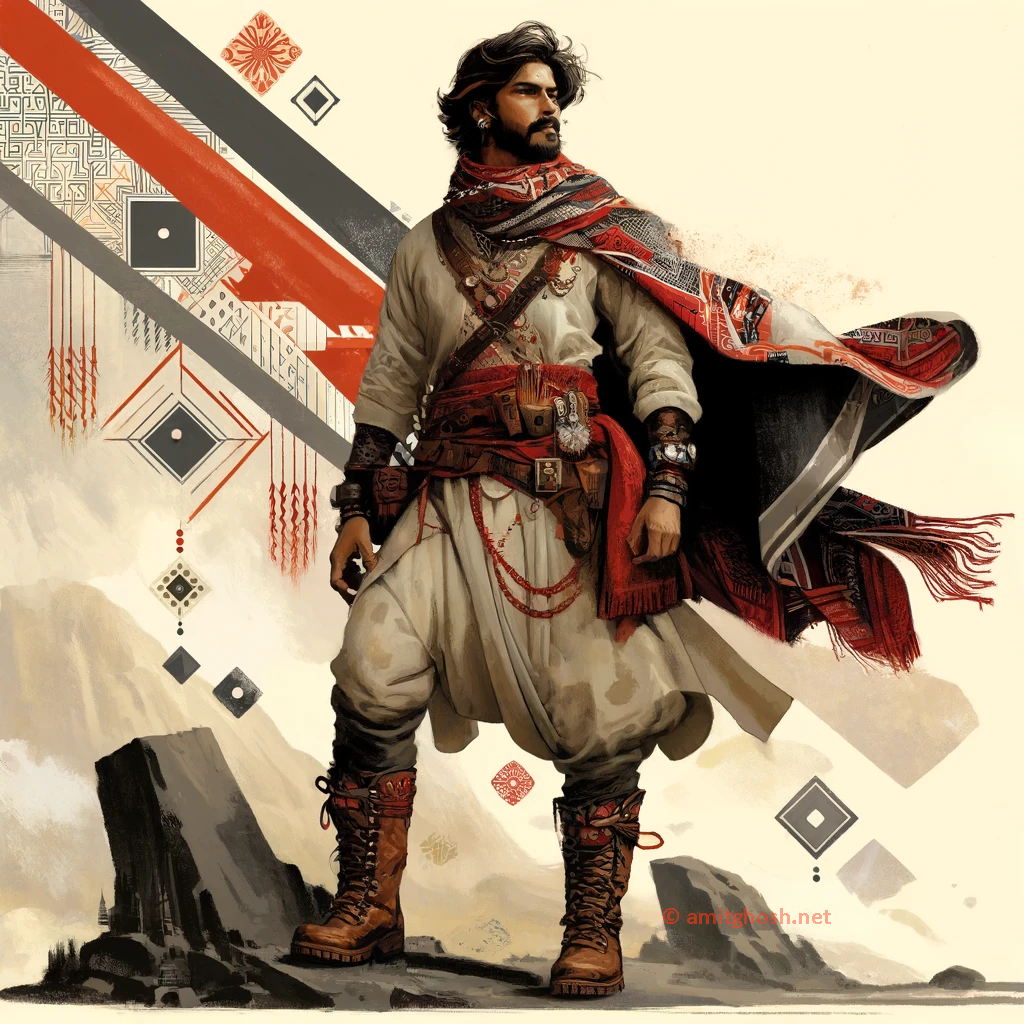
When entered Katwa, the stark contrast between the bustling marketplaces and the silent forest intrigued him. As he approached the edge of the woods, he noticed an old man struggling to gather some fallen manuscripts. Bhaskar hurried to assist him, his footsteps muffled by the soft, wet earth.
“Thank you, young man,” the old man said gratefully as Bhaskar handed him the last of the scattered papers.
Bhaskar, curious about the forest and the man’s presence there so late, asked, “What brings you to these woods at this hour?”
The old man looked up, his eyes reflecting a mix of wisdom and wariness. “I come here to gather herbs and sometimes, lost stories,” he replied, gesturing to the manuscripts. “But this forest is more than just trees and paths. It’s a place where many tales have begun and many have ended, unfinished.”
Intrigued, Bhaskar inquired further, “What do you mean by unfinished tales? Are there dangers I should be aware of?”
Seeing Bhaskar’s intent look, he leaned closer, lowering his voice as if to keep the forest from overhearing. “Be very careful. The whispers of this forest might tell you things that are hard to handle. And you should know, it’s not just a story to scare children. No one who walks into these woods at night comes back out. Bengalis, Mughals, English, French, and even the Portuguese! They all thought they’d return, but the forest keeps them somehow.”
Bhaskar, a practical man by nature, was not easily swayed by tales of spirits but respected the old man’s words. “I will keep my ears open and my steps careful. Thank you for the warning.”
The old man nodded, “Just remember, the forest listens as much as it speaks. Whatever your reason for crossing tonight, respect its presence, and it might just respect yours.”
“It is Bhaskar Bargi!” shouted the Majhi, who had been listening intently from his small boat moored along the bank. In Bengal, these boat captains are known as Majhi, a term that originates from the indigenous tribal people of Nepal, reflecting the deep connection and reverence they hold for the rivers that sustain their way of life.
“Bhaskar Bargi,” Bhaskar murmured to himself, feeling a twinge of annoyance mixed with curiosity. The name they used was his, yet it was spoken with a hint of legend as if he were not merely a man but a myth. He was certain it must be an imposter misusing his name. He also recalled hearing stories of an entire English platoon and their commander who ventured into the forest and never returned just yesterday.
He turned to face the Majhi, his gaze steady. “What tales have you heard of this Bhaskar Bargi?” he inquired, his voice calm but authoritative.
“He is a monster,” the Majhi continued his voice a mixture of fear and awe. “The locals say he and his group of thugs appear suddenly from the shadows, attacking before anyone can prepare. They say they move like a ghost through the trees, silent but deadly. Even children and women are not spared! Whole groups have gone into those woods after dark, and by morning, gone without a trace.”
Bhaskar’s chin stiffened as he processed the Majhi’s words. His reputation, twisted into tales of terror, was being used to frighten and control.
“And they say,” the Majhi leaned closer, lowering his voice, “that at night, you can hear the sounds of distant screams carried over the river wind. Some say it’s the cries of those who tried to face him, now forever part of the forest.”
Bhaskar listened, his resolve hardening with each word. “How many thugs will be waiting inside, I wonder,” he thought to himself. “No matter. Let them know that Bhaskar Pandit himself has come.”
He straightened up, eyes narrowing with determination. “Har Har Mahadev!”
With a final nod of gratitude, Bhaskar stepped into the embrace of the forest, the conversation with the old man echoing in his mind as he navigated the shadowed paths lit intermittently by the stormy sky above. As the wind howled through the trees, he couldn’t help but feel the weight of the many eyes within the depths of the dark woods.
Bengal
The storm raged over, bending trees and shaking the forest to its roots as Bhaskar Pandit made his way under the tumultuous sky. The moon, a fleeting sentinel obscured by swift, dark clouds, cast an otherworldly glow on the path ahead. As Bhaskar pushed deeper into the woods, an extraordinary sight caught his eye: a series of lanterns swaying in the wind, their glass surfaces clinking against each other, creating a symphony of whispers in the storm. These lanterns, hung from the gnarled branches of ancient trees, formed a pathway that twinkled eerily, lighting up the underbrush and casting dancing shadows on the ground. It was as if the forest itself had laid out a trail of glowing breadcrumbs, guiding him into its hidden depths.
Moved by curiosity and a sense of foreboding, Bhaskar followed the lantern-lit trail. The wind’s howl mingled with the rustle of leaves and the distant cries of night creatures, crafting a backdrop of haunting sounds that prickled his skin with a mix of dread and awe. Each step forward was a step into a canvas painted with the dark hues of an ancient and mystic world.
Suddenly, amidst the mesmerizing beauty and the chilling ambiance, a horrifying sight halted his progress. There, partially obscured by thick undergrowth, lay the body of a man, his head gruesomely severed from his neck. The jagged, brutal nature of the cut spoke of a violent struggle and a desperate end.
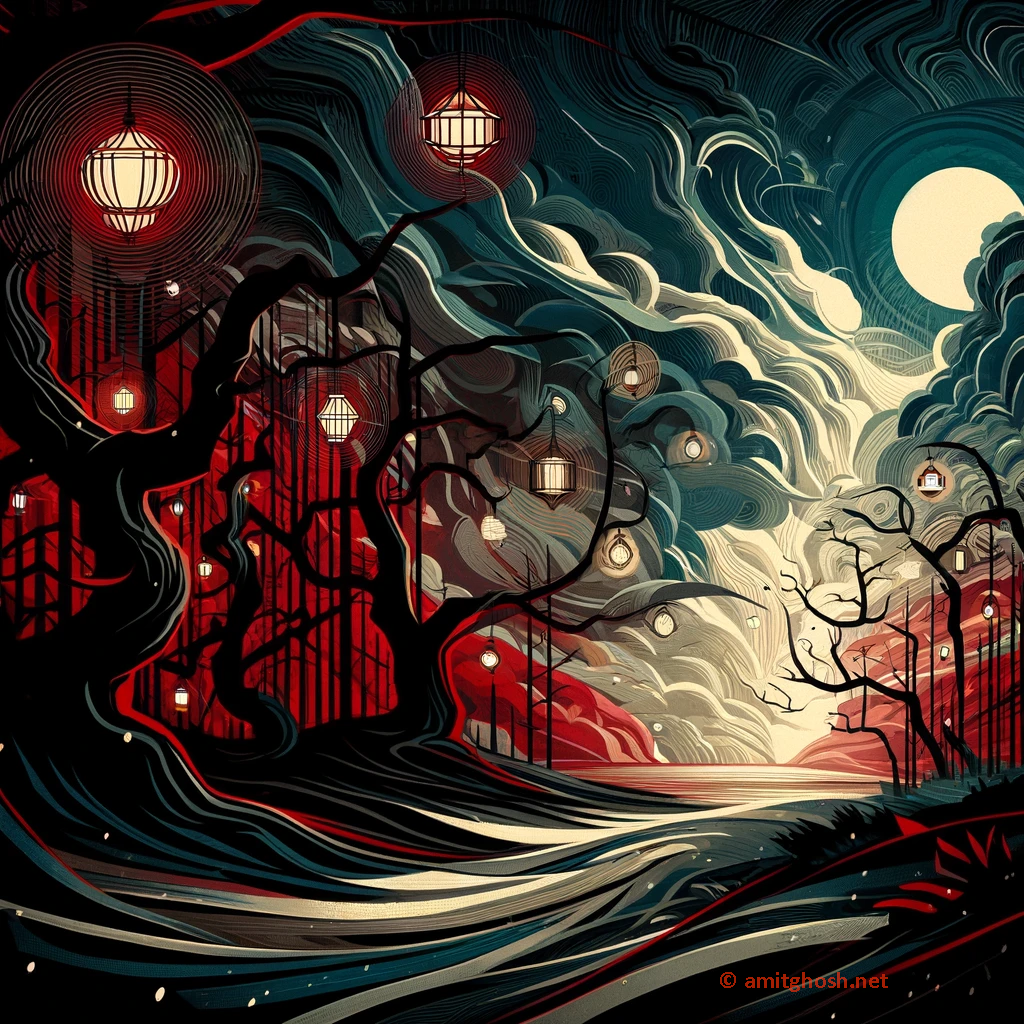
Bhaskar crouched beside the remains, his heart heavy with the grim reality of his discovery. He whispered to himself, trying to make sense of the scene, “Who were you? What cruel fate led you to this lonely end in such a forgotten part of the world?”
As he surveyed the area, his trained eyes picked up on several scattered items: a rusted, blood-stained dagger lay a few feet away, its blade catching the eerie light of the nearby lanterns. A weathered coin pouch and a torn piece of cloth with the emblem of the Mughal empire fluttered in the wind, linking the deceased to a bygone era of conquest and despair.
“This was no ordinary traveler,” Bhaskar mused aloud, piecing together the clues. “A soldier, perhaps, caught in a deadly ambush, or a deserter left to the mercy of the forest’s shadowy residents.”
Shaken yet determined, Bhaskar stood, his resolve firming. “I will uncover your story, fallen warrior. Your voice will not be silenced by the winds of this stormy night.” His words, barely audible over the roar of the storm, felt like an oath spoken to the spirits of the forest, witnesses to countless untold tragedies.
With a deep breath, Bhaskar continued along the path of lanterns. The forest seemed to watch him intently, its whispers now laden with the echoes of past agonies and the secrets it guarded so jealously.
Maratha
The next lantern flickered in the distance, a lone beacon in the dark night. Between the dark trees, hundreds of fireflies flitted about, their tiny lights glowing like bits of magic against the stormy night. It felt almost like a dream, with the soft lights bouncing gently in the air, creating a path of their own through the darkness.
He continued forward, his boots sinking into the soft, wet earth, sometimes making it hard to walk. For a moment, he felt as if he had walked in a big circle. “Have I been here before?” he wondered aloud, looking around at the few cows and goats that roamed freely, munching on the wet grass. They seemed completely at ease, unaffected by the storm or the strange happenings around them.
The forest grew denser, the thick trees blocking out most of the moonlight. The storm’s roar lessened here, muffled by the heavy foliage, and the glow from the fireflies seemed to take over, casting eerie shadows on the ground. Bhaskar moved carefully, his eyes adjusting to the mix of natural and firefly light.
Soon, he came upon a small clearing where a campfire still burned low.
Another startling discovery awaited him—a body lay near the fire, the throat cut in the same vicious manner as the first. It looked like the shepherd who might have owned the roaming cows and goats, perhaps deciding to camp here when the storm grew too fierce.
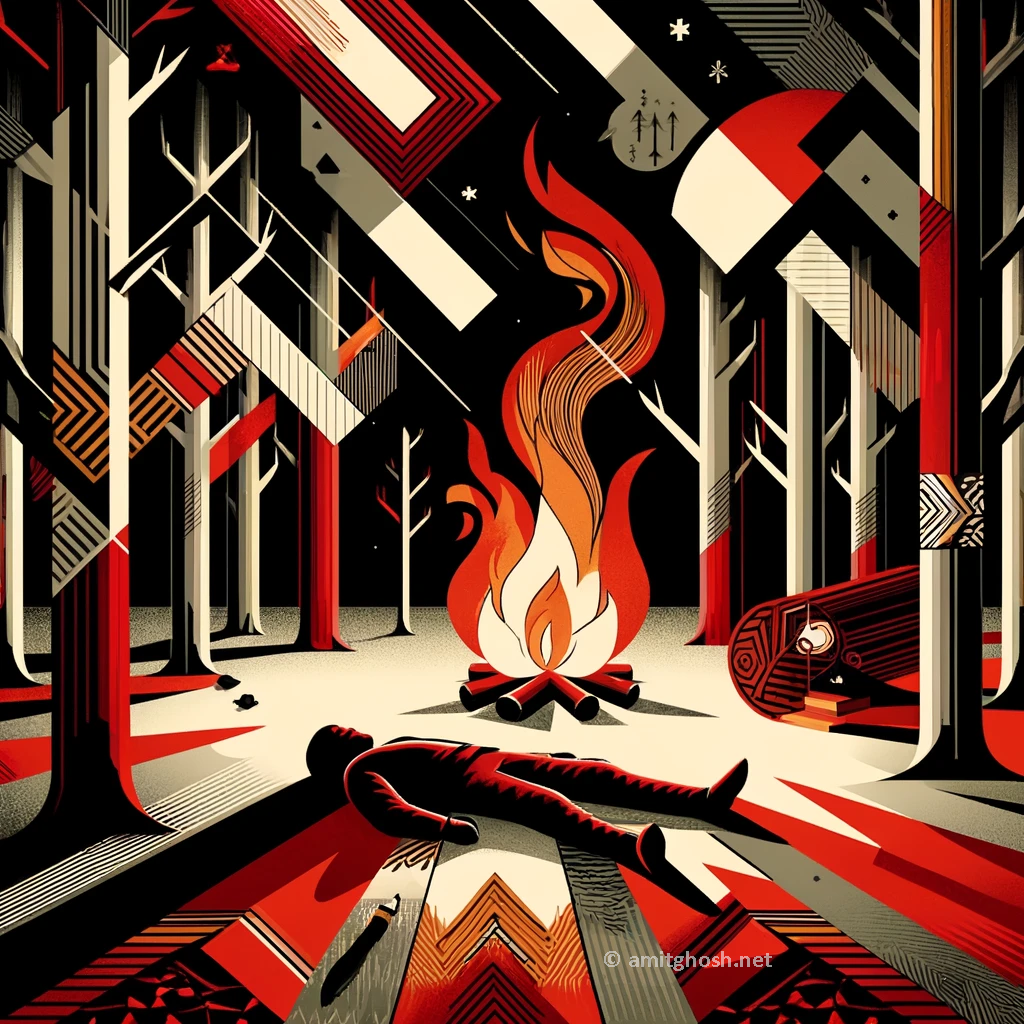
“This is no coincidence,” Bhaskar muttered to himself, crouching to examine the scene more closely. “Same cut, same brutality. This was done by the same hand.” His gaze then fell on the muddy footprints leading away from the campfire. “The murderer left a trail.”
Rising to his feet, he followed the footprints, a sense of urgency building within him. “Whoever did this must be nearby,” he thought, quickening his pace, his heart pounding in his chest as he navigated through the thick mud and underbrush.
His rush came to an abrupt halt when he stumbled upon a horrifying sight—a cart filled with more bodies, all missing their heads. The smell of blood mixed with the earthy scent of rain was overpowering. “What madness is this?” he exclaimed, stepping back in shock.
Bhaskar stood there for a moment, trying to gather his thoughts. “This is the work of a monster, not a man,” he whispered to himself, his resolve hardening. “I must find this killer before they strike again. These poor souls deserve justice.”
Taking a deep breath to steady his nerves, Bhaskar continued on the muddy trail, determined to uncover the truth behind these gruesome deaths and to put an end to the terror that lurked within the whispering woods.
Military
Aurangzeb, the last of the powerful Mughal emperors, died in 1707 after a long and controversial reign marked by military campaigns and religious orthodoxy. His death led to a succession crisis among his sons. Azam Shah initially claimed the throne but was emperor for only two months before his brother, Bahadur Shah I, defeated him in battle and took over the leadership. Bahadur Shah I ruled until he died in 1712 at the old age of 68. His reign, though brief, was noted for its attempts to reconcile with the various factions within the empire and manage the increasingly independent provincial governors.
After Bahadur Shah’s death, his son Jahandar Shah ascended to the throne. His tenure lasted only 11 months, during which his administration was marked by decadence and inefficiency. In a dramatic turn of events, he was overthrown by Farrukh Siyar, a rival claimant, who had Jahandar Shah brutally blinded as a means to secure his position as emperor in 1713. Farrukh Siyar’s rule lasted until 1719, characterized by intrigue and brutality, with his eventual downfall coming in a similarly violent manner as his predecessor’s. He was blinded and murdered by his opponents within the court.
The empire continued to weaken under these turbulent successions. Muhammad Shah, who came to power in 1719, faced numerous challenges during his reign, which lasted until 1748. His rule saw the further disintegration of central authority, and significant losses of territory, particularly to the rising power of the Marathas. Under his watch, the once vast Mughal Empire began to crumble, setting the stage for later invasions and the eventual dominance of European powers in India.
Bhaskar Ram Kolhatkar, more commonly known as Baba Bhaskar Pandit, was a notable Maratha general and the revenue minister (dewan) under Raghuji Bhonsle, the ruler of Nagpur. His military prowess was instrumental in expanding the Nagpur kingdom, particularly evident during the Maratha invasions of Bengal in 1741 and 1744 and the conquest of Chhattisgarh.
Bhaskar Pandit is in charge of significant military campaigns aimed at enforcing the Maratha right to collect Chauth from the Nawab of Bengal.
Bhaskar, known for his cunning strategic acumen, decided to meet the Nawab of Bengal alone first, despite the dangers. He believed his covert network within the Nawab’s palace would provide him with the necessary support. Smirking at the thought, Bhaskar mused, “Half of the Nawab’s court doesn’t even know they’re reporting to me.”
Tactics
As his mind briefly got preoccupied with scenarios of the forthcoming encounter, he suddenly stumbled into what seemed like a small hidden pond but was, in reality, a concealed pit. The stench was overwhelming, a putrid smell of decay that filled his nostrils and made his eyes water. As he tried to understand his fall, he realized with horror that the pit was filled with human bones.
Scrambling to hide as he heard approaching footsteps, Bhaskar quickly submerged himself further into the gruesome pool, covering himself with bones to avoid detection. “This must be Nawab’s way of dealing with enemies,” he thought grimly, his heart racing as the light from three torches, or ‘mashals’, appeared near the pit.
“Perhaps they had heard his fall or were simply on a routine patrol.” He thought. “Nawab is a very smart guy to spread these ghost stories.”
As the torchbearers approached, Bhaskar held his breath, trying to make as little sound as possible. The conversation among the men grew louder as they neared.
“Did you hear something?” one of the men asked, his voice tinged with caution.
“Just the storm, perhaps,” another replied dismissively. “But keep your eyes sharp. Let’s just check the pit. You know the orders.”
As they neared, Bhaskar could see the flickering light of their torches casting long shadows over the bones that now camouflaged him. He thought about his mission, the tumultuous history of the recent Mughal rulers, and how every moment of power and betrayal had led him to this pit—hiding, waiting, and hoping to survive.
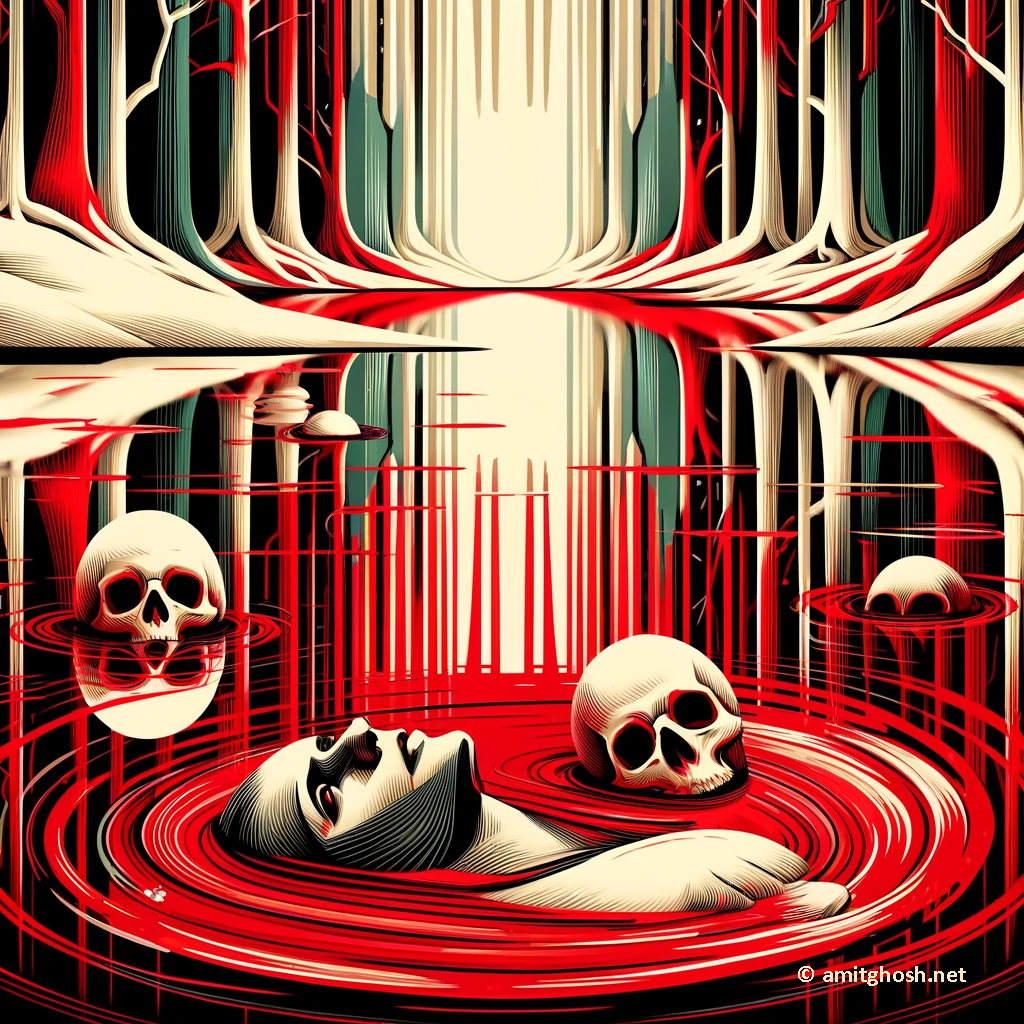
In the heart of the storm-shrouded forest, Bhaskar Pandit, hidden beneath the bones in a grim pit, caught his breath as he witnessed a sight that defied all logic. The torchbearers he had initially thought were mere guards turned out to be beings of an almost mythical appearance. Their skin shone with a golden hue, and their tall, muscular forms towered over any normal human. Most strikingly, each had three eyes and four arms, their attire reminiscent of ancient warriors clad in iron gear. The white, pupil-less eyes burned brightly, casting an otherworldly glow in the dim light of their torches.
“Where in the world have I landed?” Bhaskar thought to himself, his mind racing to make sense of the vision before him. “Could I have ingested something strange?” He quickly dismissed the thought; he was always careful, especially when on a mission. The pungent smell of blood and decay that filled his nostrils was proof enough that he was very much in the realm of reality.
As the storm intensified around him, thunder roared and lightning flashed, momentarily illuminating Bhaskar’s face marked with a tattoo of a ‘Damaru’—a small two-headed drum associated with Lord Shiva—now smeared with the blood from the pit. Whispering a prayer, “Har Har Mahadev,” a declaration of devotion to Shiva, he kept his eyes fixed on the retreating figures of the mysterious beings as their torches faded into the forest.
Bhaskar’s heart did not race with fear; unlike many, he seemed devoid of the hormone that sparked panic. His training and faith had prepared him for moments of danger, though none quite like this. As the strange soldiers disappeared, Bhaskar slowly, carefully emerged from his hiding spot, his mind alight with questions and the need for caution.
“This is no ordinary mission,” Bhaskar murmured to himself as he wiped the mud and blood from his arms. “These are not mere bandits or tribal warriors… What are these?”
As Bhaskar Pandit crept closer through the forest, the noises of the storm softened, and the once loud whispers of the woods quieted down. He couldn’t see any of the torches he had spotted earlier, but the sound of metal armor clinking together grew louder with each cautious step he took. The fireflies, glowing softly around him, provided just enough light to see by, filling the dark gaps where the moonlight couldn’t reach through the thick tree branches.
Moving slowly and staying low to the ground, Bhaskar made his way toward the mysterious sounds. He was careful to avoid stepping on twigs or rustling leaves too much, knowing that any little sound might give him away.
Finally, he could hear voices among the clinking of armor. He paused and listened to two of the strange, tall beings talking. They were close enough now that he could hear them clearly, but their conversation was hard to understand at first—it sounded like they were using big, fancy words.
“We must guard with great care,” said the first being, his voice deep and strong. “There are many who would like to free it, and we cannot let that happen.”
Bhaskar lay quietly in the shadows, trying to make sense of their words. They were talking about a treasure? That sounded important—and dangerous. He wondered what kind of treasure needed such powerful guards.
“Wait. They are talking about freeing a treasure?” He got confused as he thought of it again.
He decided to keep listening, hoping to learn more about the treasure and why it was so special. Maybe it was something very old or very valuable. Either way, Bhaskar knew he needed to find out more before he could decide what to do next.
As he settled in to listen, another crack of thunder rolled softly in the distance.
Conflict
As the first hints of morning light struggled through the dense canopy of tall trees, Bhaskar Pandit found himself unable to remember when he had fall asleep. The forest remained shrouded in mist, and the iron guards he had observed the night before were nowhere to be seen.
“Maybe they’ve gone on patrol,” Bhaskar thought, scanning his surroundings carefully. The air was cool and thick with fog, but other than that, everything seemed peaceful.
Ahead of him, Bhaskar spotted the massive doors where he had seen the three tall guards. The doors were enormous, about 20 feet in length, crafted from old, thick wood that seemed to merge seamlessly with the natural growth of the trees around them. Intrigued, Bhaskar hurried over and tried to push the doors open.
Despite his formidable strength, the doors didn’t budge—not even a little.
“What the hell?” he muttered under his breath. “Giant doors for giant people.” He chuckled at the thought, but his amusement quickly faded as he pondered the reality of encountering such beings. Just on the left side, he noticed rags that looked centuries old, covering what appeared to be another door.
Bhaskar decided to prepare for whatever might come next. He gathered stones and leaves, quickly sparking a fire. Once the fire was set, he slipped back to his hiding spot from the previous night.
“What if the giants come?” he considered, his heart pounding with a mix of fear and excitement. Even for a seasoned warrior like himself, the possibility was daunting.
It took only a few minutes before he saw movement in the area.
Bhaskar peeked from his hiding spot, watching as the space around the doors cleared. The rugs are burned down. He evaluated his next move and then swiftly crossed to what looked like a minor cave entrance opposite the giant door.
The compelling force of curiosity, so deeply ingrained in humans, often leads us to defy and surpass our most deepest fears.
“This is no castle,” he whispered to himself, “but it might lead somewhere important.”
As he stood at the entrance of the cave, Bhaskar took a deep breath, ready to explore further. He was in unknown territory, far from the battlefields he was familiar with, but his warrior spirit urged him on. “Time to see where this leads and what these giants are guarding,” he murmured, stepping cautiously into the cave, prepared for anything that might come his way.
Economy
Bhaskar had only taken a few steps inside the cave when he found himself squeezing through a tight space, the roots of the banyan tree encroached most of the space hence creating a narrow shaft he had to crawl through.
The air was damp and earthy, thick with the scent of moss and old stone. Just as he thought he was getting used to the dark, confined space. A terrifying scream shattered the silence. It wasn’t like anything he’d ever heard before—it seemed as if a huge monster was crying out in agony.
“Oh no,” he gasped, his heart racing as adrenaline surged through his veins.
As he pushed forward, the narrow passage suddenly opened up into a vast room, one that seemed to belong to another time entirely—an era long forgotten. With no time to waste, Bhaskar quickly scurried to a dark corner near a pillar to hide.
The place he had stumbled into was like a temple, but unlike any temple he’d ever seen. It was entirely underground, with no sign of the sky above, yet it was as bright as day due to the fire marshals scattered all around, casting flickering shadows and illuminating the cavernous space.
In the center of the room, he saw about 24 giant soldiers standing in formation like disciplined soldiers. Nine of them also have horses. They all had four arms and three eyes, their skin shimmering gold in the firelight. The sight was both awe-inspiring and terrifying.
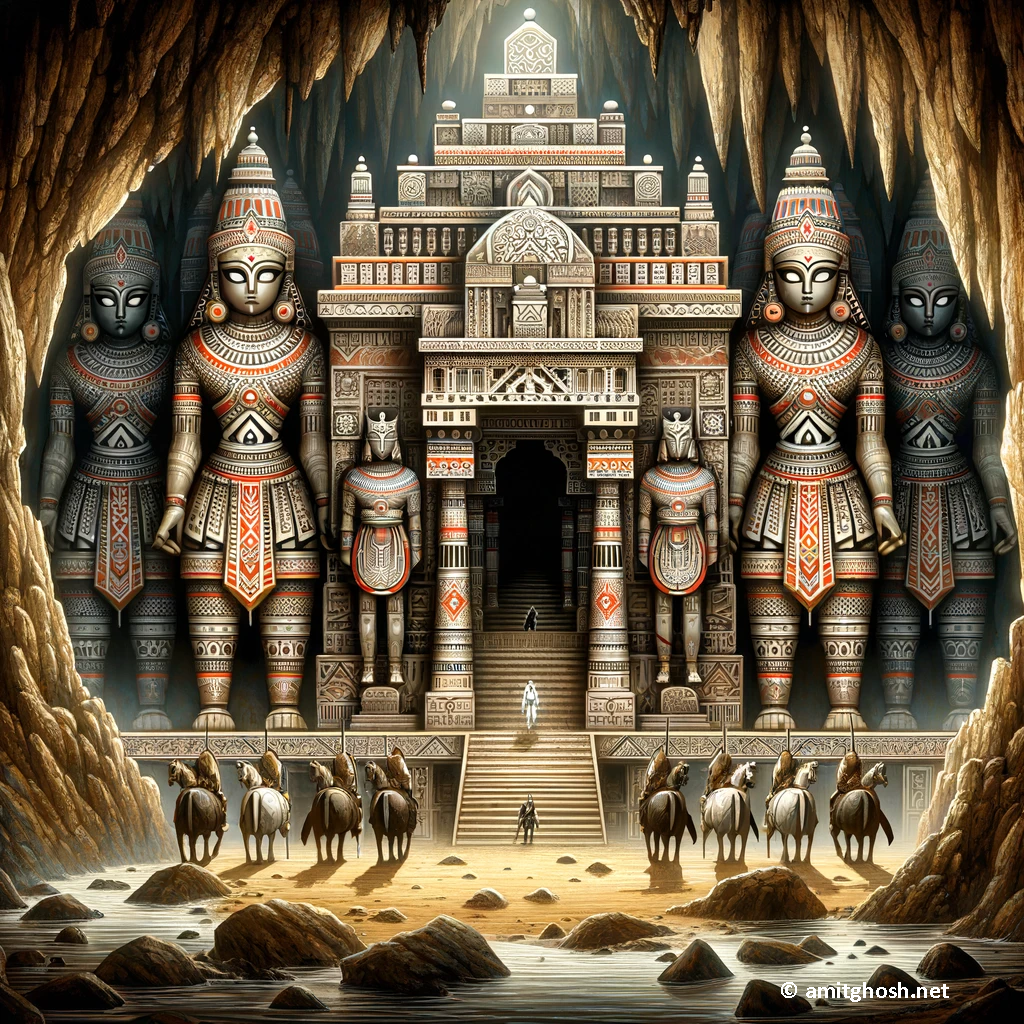
But these were unlike any horses he had ever seen. They were terrifying not only in their size and bearing but also in their composition—they appeared to be made entirely of stone like those giant guardians. Each horse was intricately carved, with muscles tensed as if caught in mid-gallop and manes that seemed to flow with a life of their own despite being stone.
“They look like they are made of stone. But who is going to pinch and test?” Bhaskar’s throat felt dry as fear constricted his breathing. “I won’t die here,” he whispered to himself, trying to steady his nerves as he edged further into the shadows cast by the massive pillar.
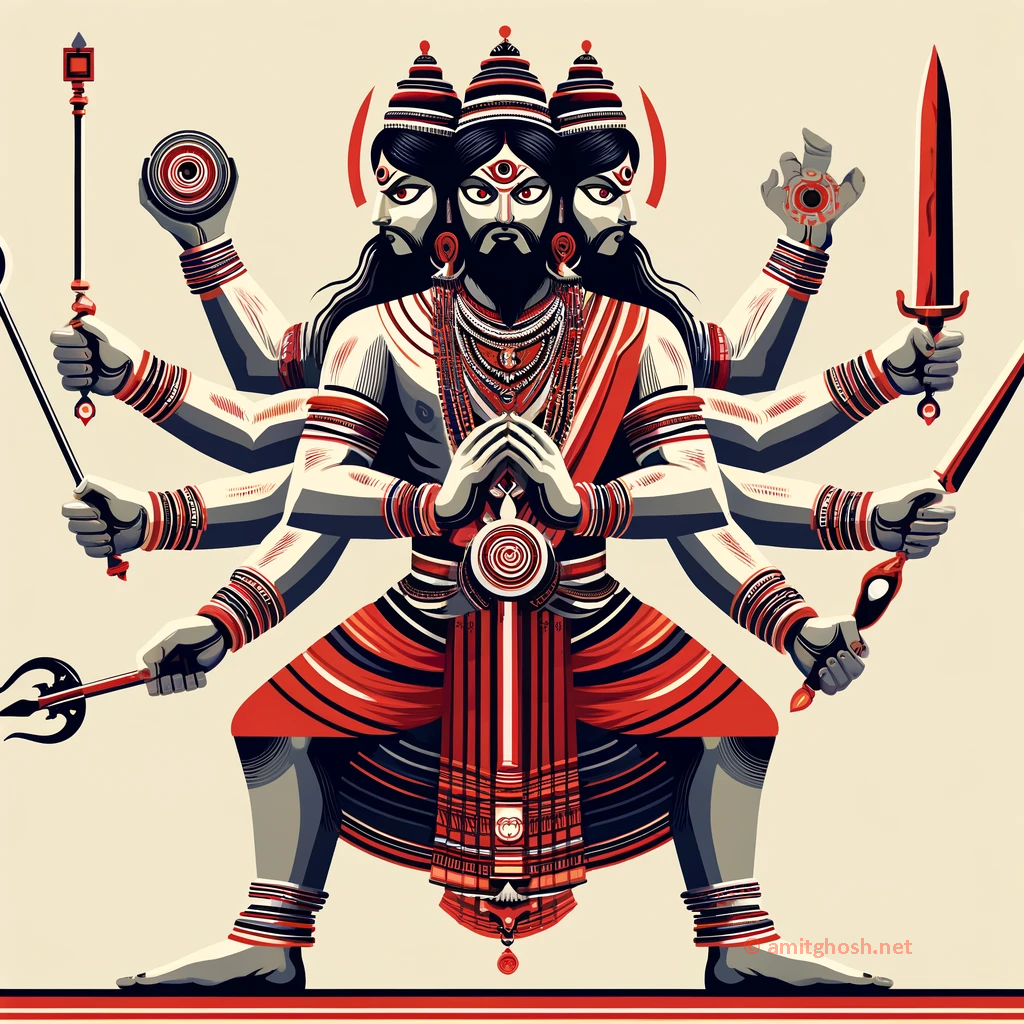
Then, from somewhere in the distance, the sound of a heavy bell tolled, echoing through the vast underground chamber. The deep, resonant sound seemed to vibrate through the very stone around him.
Trying to gather his courage, Bhaskar took a deep breath and reminded himself of his mission and his skills as a warrior. “This is just another challenge,” he told himself quietly. “Observe, learn, and stay alert.”
As he watched from his hiding spot, Bhaskar focused on the giants’ movements and the layout of the room, looking for anything that might help him understand where he was and what these beings were guarding so solemnly. His mind raced with questions: Who are these giants? What is this temple? What treasure they are guarding? Who is coming to free it? Was this an ancient ceremonial site? What was the significance of the bell?
Most importantly – Are they human?
As Bhaskar crouched in the shadows of the massive pillar, he became acutely aware of a sharp pain throbbing on the left side of his forehead. He remembered the fall into the pond the day before—an unexpected plunge that had left him scrambling in panic and confusion. During the fall, he had sustained a cut on his forehead, which had now begun to ache.
Bhaskar silently unwrapped the cloth he habitually kept around his left wrist. This piece of cloth was more than just a random accessory; it was a practical part of his survival kit, serving multiple purposes in times of need. He gently rolled the cloth, folding it with precision born of countless similar situations in the past where he had to tend to his own wounds without assistance.
Once folded to the right width, Bhaskar carefully placed the cloth against his forehead, pressing it gently against the wound to absorb any blood and to cushion the tender area. He then wrapped it around his head, tying it securely at the back, much like a bandana. This not only helped to keep the cloth in place but also applied steady pressure to the cut, which would help reduce swelling and stanch further bleeding.
With the makeshift bandage in place, Bhaskar peeked around the pillar once more, his gaze settling on the giant guardians standing ceremonially around the temple. Each detail of their appearance and demeanor seemed to tell a story of ancient traditions and formidable power—a story Bhaskar was determined to understand.
Negotiation
Bhaskar, enveloped by shadows and the eerie glow of the fire marshals, focused on the giants and their mesmerizing presence. As he observed, whispers began to float through the cavernous chamber, whispers that seemed to dance with the flickering shadows on the walls.
The whispers grew louder, becoming clear voices that seemed to echo from the depths of the chamber. One of the giants, a towering figure with a voice as deep as the underground itself, spoke to his comrades, “The prophecy states that the Guardian of the Door will be challenged when the stars align and the skies open. We must be vigilant.
Another giant, slightly smaller but with an air of authority, responded, “The stars have indeed been restless of late. Have the watchers sent any word on the movements above?”
As Bhaskar listened, he pieced together their concerns about an ancient prophecy and a looming challenge. His mind raced—could this be linked to the mysterious treasure they mentioned earlier? His thoughts were abruptly interrupted by a new sound, the gentle patter of footsteps approaching from a hidden passage within the temple.
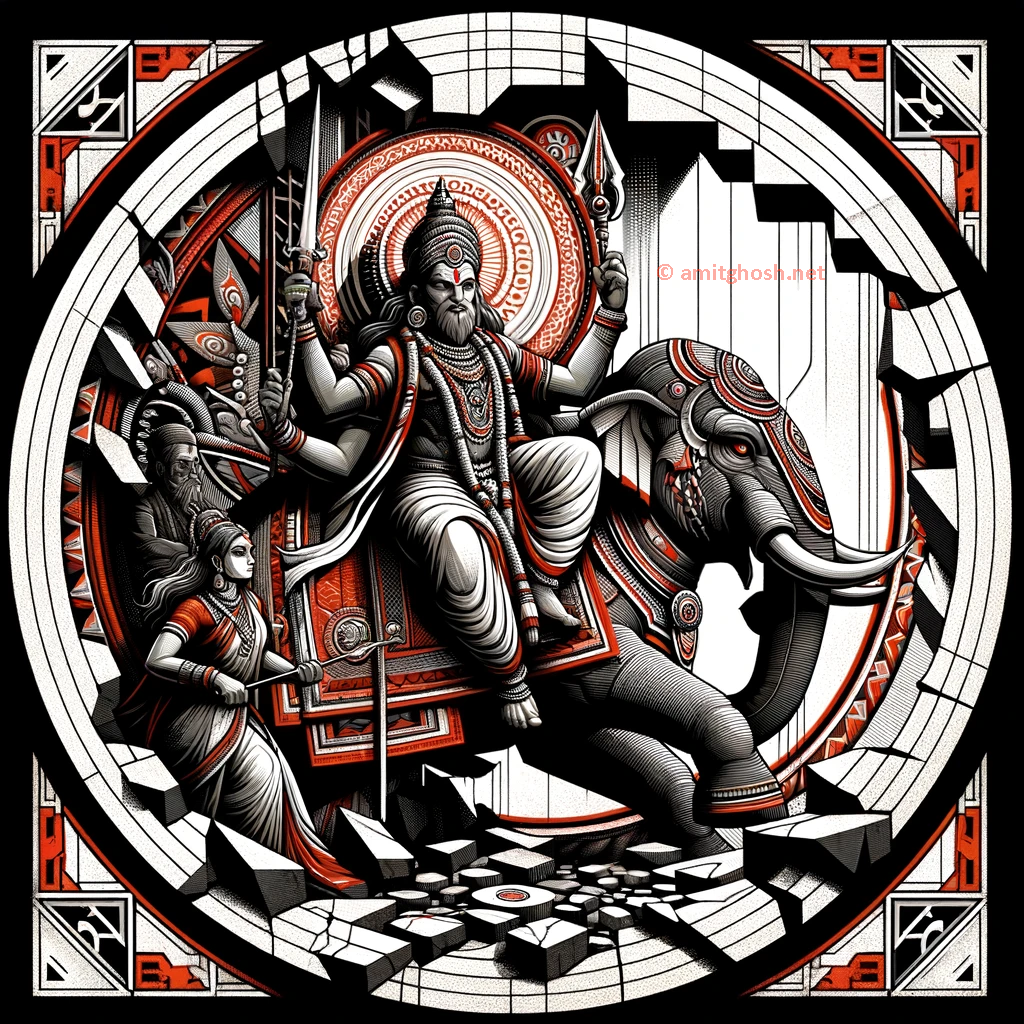
A group of three figures emerged, shrouded in cloaks that blended with the darkness. Unlike the giants, these newcomers were of human stature, and their approach was cautious, almost reverential. But, These were not ordinary men; they wore traditional dhotis, leaving their upper bodies bare, and each held a trident in their hands. Their bodies were completely covered in ashes.
“Har Har Mahadev”, The leader of the group, a wiry man with keen eyes, spoke in a hushed tone, “We have come as the prophecy foretold, to seek the wisdom of the Guardians. We bring offerings to appease the spirit of the Door.”
Bhaskar watched as they presented small, luminescent stones that glowed with an inner light. The giants, upon seeing these stones, relaxed their stance slightly, and the leader gestured for the newcomers to approach.
Seeing this exchange, Bhaskar realized that these visitors might be key to understanding the deeper secrets of this ancient place. He decided to follow them once they concluded their parley with the giants. As the visitors conversed with the giants, Bhaskar used the distraction to edge closer, moving silently among the shadows to avoid detection.
Rebellion
Bhaskar’s eyes settled upon the ancient seal impressed upon the crumbling wall of the cavern. It depicted a powerful figure seated on a grand elephant, flanked by a formidable entity wielding a thunderbolt—undoubtedly the symbols of Indra and Airavata, with Indrani by their side.
In the dim half-light of the cavern, with the echoes of the ash-covered humans and giant guardians’ words still hanging in the air, Bhaskar’s gaze was torn between the ancient seal and the path that lay ahead. A faint, almost imperceptible draft beckoned him towards a narrow passage veiled in shadow. With cautious steps, he proceeded.
As he navigated the tight corridor, Bhaskar’s fingers grazed the rough stone, feeling the vibrations of history within. The passage twisted and turned, the air growing cooler with each bend. He could hear the distant roar of wind—a sound that promised open space and, perhaps, egress.
The corridor finally gave way to a wider vestibule adorned with bas-reliefs that chronicled battles and unions, stone carved walls that spoke of the interweaving of human and divine dramas. At the far end of the vestibule, a sliver of light beckoned. Bhaskar moved towards it, his senses heightened, his body tensed for any threat that might emerge.
He emerged into a vast, open-air expanse. Before him lay an ancient stone bridge, arching gracefully yet mightily over a chasm that cleaved the earth asunder. The wind here was a living thing, a roaring entity that tugged at his clothes and whipped his hair wildly.
There, stationed at the end of the bridge as if, was a lone figure—a British soldier, appearing as out of place in this ancient realm as a wolf among sheep. The soldier’s eyes were fixed on the opposite end of the chasm, unaware of Bhaskar’s approach.
“How this British with full body ended up here?” Bhaskar thought, his mind racing as he crouched behind a tangle of roots that veiled him from sight. “I thought these people are fond of heads.” It was a grim humor, born of the grotesque scene of headless bodies he had witnessed since his venture into the forest. Their stories ended in silent screams.
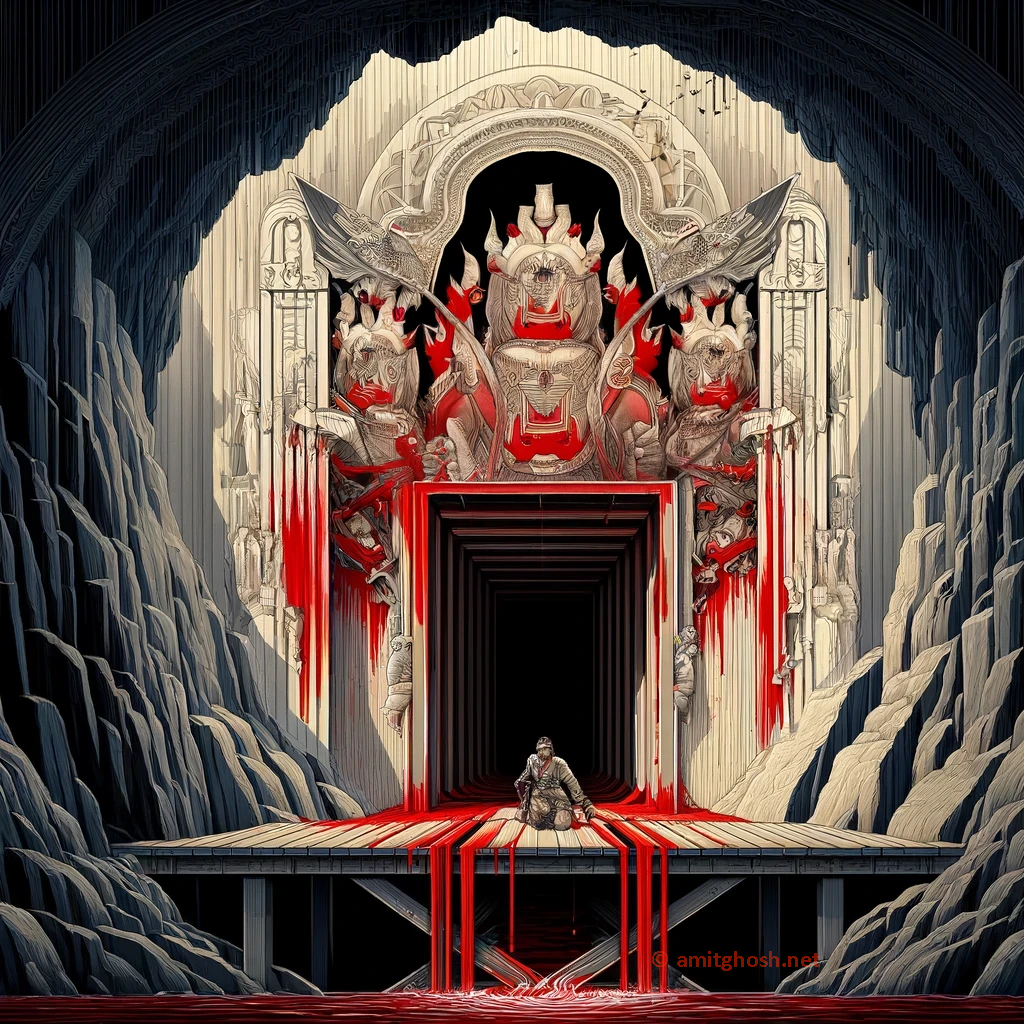
Bhaskar struggled to regain his senses, his warrior’s instincts screaming for action.
However, before he could utter a word, a shadow loomed over him—a giant figure with his four hands wielding a club, muscles rippling with contained power. With a swift dive for cover, he evaded the immediate danger, his mind racing with plans for survival and understanding.
There was a deliberation in the giant’s movement, a ritualistic intent that belied a deeper purpose. Were they the guardians of this realm, or its executioners? The English soldier, stiff with discipline or fear, remained stationary as the towering figures drew near.
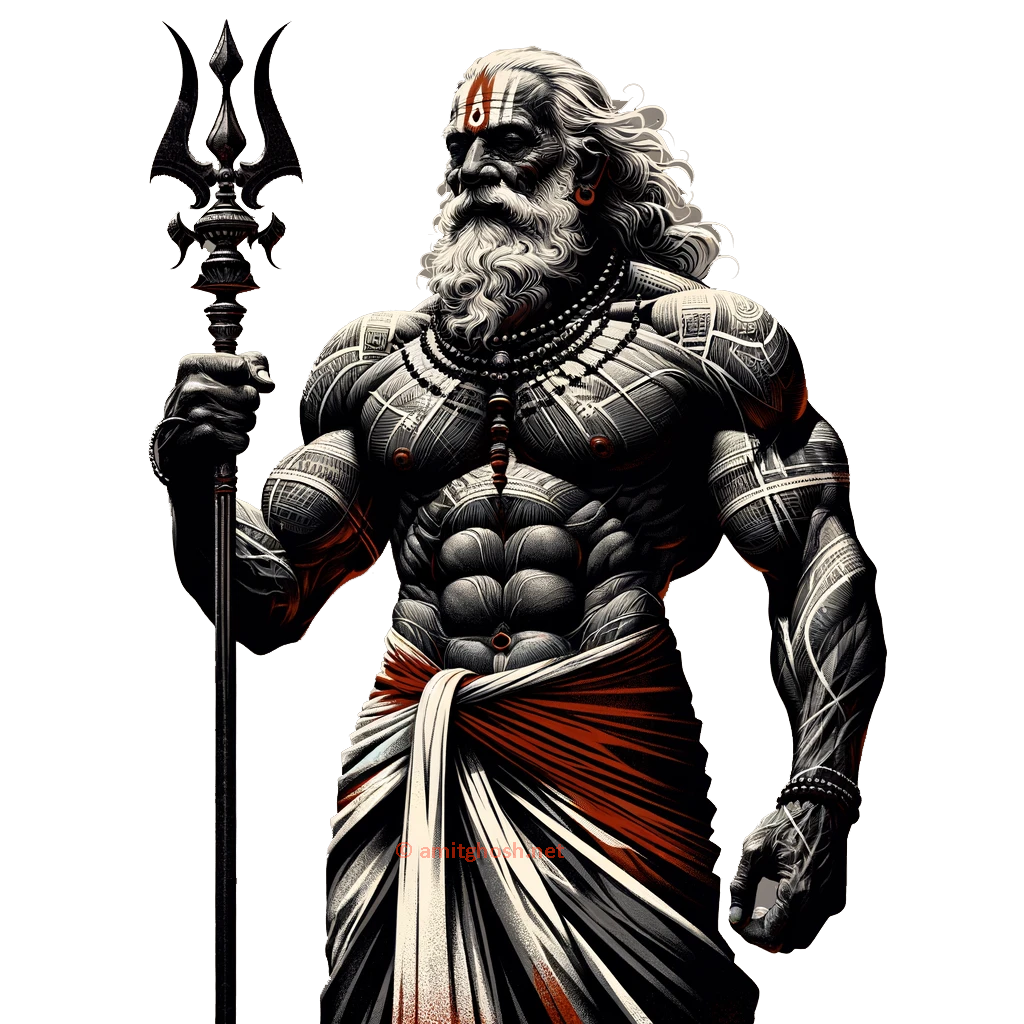
Bhaskar’s breath caught as the ground beneath him gave a soft creak, and out of the shadows, one of the ash-covered figures approached, his bare upper body and dhoti-clad form emerging into the faint light. His trident glinted, and his gaze was intense, yet not unkind.
“Who dares to walk the guarded path of the Ancients?” the ash-covered man asked in a voice that held the weight of ages.
“I am Bhaskar,” he responded, stepping into the open with a warrior’s poise, despite the tightness in his chest. The ash-covered man’s eyes, intense and searching, fixed upon the mark on Bhaskar’s forehead—a symbol that seemed to resonate with the ancient traditions of this place. It felt like this ancient being can pierce through his bandana through his naked eyes. In that instant, a glimmer of recognition, perhaps even reverence, flickered across the ash-covered man’s visage.
Yet before the silent exchange could evolve into revelation, an abrupt force struck him. A club, wielded by the giant, collided with his abdomen, stealing his breath and plunging him into darkness.
A resounding cry pierced the turmoil, a declaration that seemed to shake the very foundation of the cavernous temple. “Har Har Mahadev!” The ash-covered man thrust his trident skyward in a salute, or perhaps a ward.
As the world blurred at the edges, the last thing Bhaskar saw was the giant approaching the British soldier, an ominous shadow falling over the man who sat alone and defenseless. The giant’s weapon, swift and sure, descended in a vicious arc, and with a singular, ghastly stroke, the soldier’s head was severed from his body. Bhaskar’s last conscious thought was the sensation of falling, the wind whistling past his ears as he passed out.
The British soldier’s head tumbled near Bhaskar, where he lay subdued by force, the soldier’s head came to a haunting pause, eyes locked with his in a silent, eternal gaze. The dead eyes of the British soldier, wide with the shock of a final moment abruptly met, stared back at him, a silent accusation, a silent question that would remain unanswered in the void that was claiming him. A stabbing discomfort took hold of his forehead.
Nothingness claimed Bhaskar, swallowing him whole as he lost consciousness, the final image of the British soldier’s lifeless stare imprinted on the canvas of his mind.
To be continued …

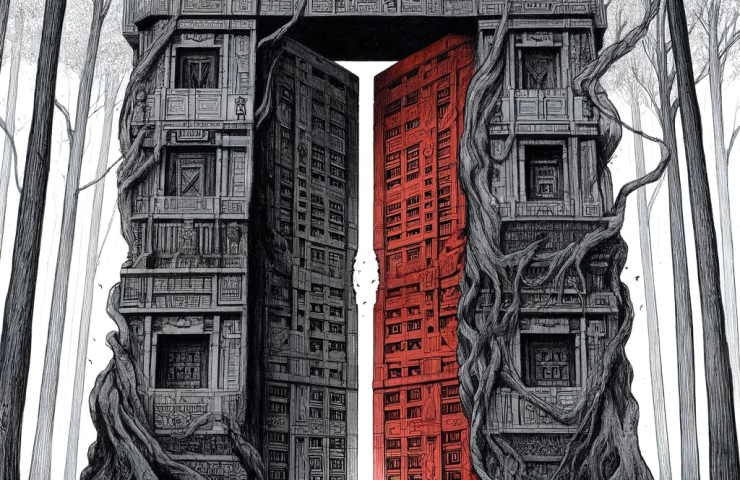
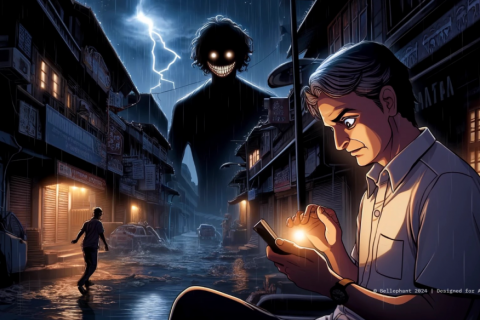
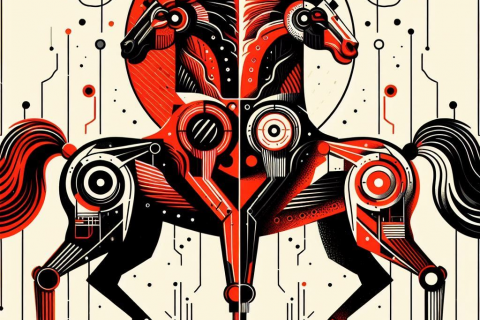








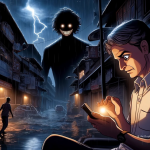

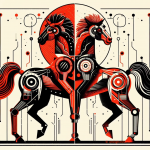
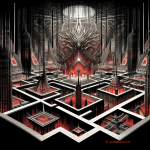
Leave a Reply